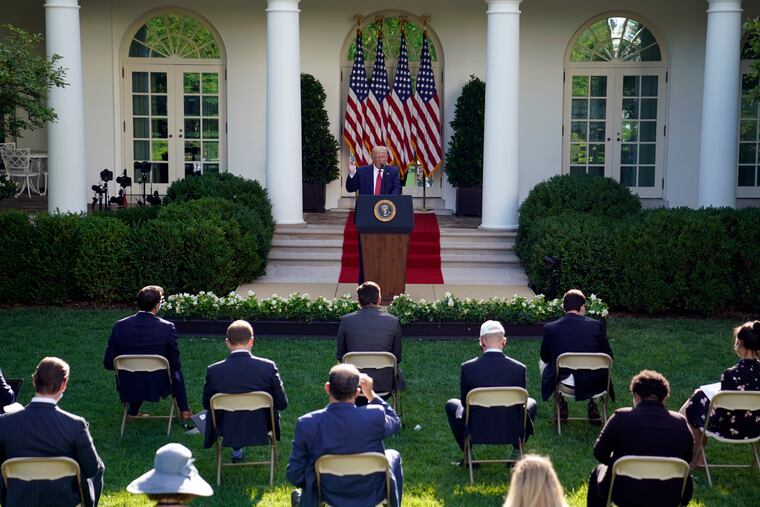Trump puts aides on tightrope with proposal for nomination acceptance speech at White House
President Donald Trump's idea to give his nomination acceptance speech from the South Lawn of the White House may be legal -- for him. But it lays out a minefield for the staff charged with putting such an event together.

President Donald Trump's idea to give his nomination acceptance speech from the South Lawn of the White House may be legal -- for him. But it lays out a minefield for the staff charged with putting such an event together.
Legal experts said White House staff would violate the federal Hatch Act by planning or participating in such an event. The Hatch Act bars U.S. government employees from conducting any political activities during work hours, while in a government building or while wearing a government uniform.
The president and vice president are exempt from the law. But everyone else who works at the White House, from the chief of staff to the groundskeepers and event planners, are not.
"There is a legitimate objection to this. It's never been done before and it involves massive use of White House personnel," said Richard Painter, the chief White House ethics lawyer in the George W. Bush administration.
Painter said every federal employee who attends the event in their official capacity would be breaking the law.
"If he has White House staffers there with him, if he starts to put on a show, they bring in bleachers, they bring in an audience, you get protesters outside and have to deal with that, at that point you're using a lot of federal resources for purposes of putting on a political stunt," Painter said.
And having campaign workers come to the White House isn't a solution, either.
While campaign staff aren't affected by the Hatch Act, the government officials such as U.S. Secret Service agents who would provide security for them are.
"Every one of those campaign officials has got to go through Secret Service and they've got to give their Social Security number, they've got to have background checks on those people and that comes at taxpayer expense," Painter said.
Painter, a vocal critic of the president, alleged that Attorney General William Barr violated the Hatch Act after he used federal law enforcement personnel to clear protesters from a park across from the White House before the president entered it.
Republican Sens. John Thune of South Dakota and Mitt Romney of Utah also questioned the legality of a White House lawn acceptance speech.
"Is that even legal? I assume that's not something you could do," Thune told reporters. "I don't know if that's ever been done before. Maybe the 1800s, something like that?"
Romney mused, "I don't know if it's technically legal or not, but it's got to be somewhere."
When asked for comment, White House spokesman Judd Deere simply noted the president is not subject to the Hatch Act, though did not comment on whether the administration was concerned about staffers being in violation. The Trump campaign and the Republican National Convention planning committee both declined to comment, deferring to the White House.
Initially, the convention was to be held in Charlotte, N.C., until Trump changed plans because Gov. Roy Cooper, D, refused to ease social distancing and other protective measures aimed at slowing the spread of covid-19.
Trump moved his acceptance speech to Jacksonville, Fla., but as cases increased there, he scrapped the Jacksonville event entirely. As of now, official convention business will still be held in Charlotte but the RNC has not announced the location for his acceptance speech.